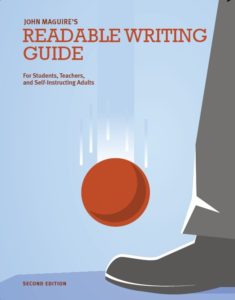If –ion words are the enemy of clear writing, then what?
As we understand sentences more, we want to make them active. But just wanting to be more active doesn’t always do the trick, because our sentences often are based on “is” or “are.” [Like this one using are based.]
Faced with a dull sentence, and wanting it to sing, I work hard to recall active verbs to mind. There are several ways to do that and one of the best is the conscious conversion of -ion nouns to active verbs. An –ion noun, of course, is an abstraction that ends in –ion. English has a bazillion of them and they are very useful, but too many of them in a single paragraph will put your reader to sleep.
I should note here that I personally dislike almost all -ion words. To me they are like flies at a picnic—if I can’t kill all of them, I damn well sure want to get rid of most of them.
So I have an editing habit you might call “search and convert.” I look for the abstract nouns in a sentence, cross them out, and convert them to verbs. Almost all abstractions have verbs buried in them. For example, “abstraction” has the verb “abstract” in it. Most abstractions are nouns that have been condensed from or congealed from a root that is a verb.
Here are abstract nouns that have been formed from verbs—you should be able to tell which verb is the root of the word. Fill in the verb mentally.
Application: Apply
Inhibition
Cookery
Construction
Constitution : Constitute
Declaration
Here’s what professional writers of English never forget: the root verb form is better than the noun form. It’s easier to understand. Apply is easier than application and inhibit is easier than inhibition and cook is easier than cookery. Etc.
My “search and convert” habit goes back 40 years; it’s instinctive for me now. You too can develop this instinct if you practice it and make it a habit. Here’s how. First you notice the -ion word, then you deduce the original word, and finally you recast the sentence using the verb. Examples.
The application is due on Tuesday. Apply. You must apply by Tuesday.
She showed such inhibition, he wondered if she ever would be a ballerina. Inhibit.
She was so inhibited he wondered if she would ever be a ballerina.
She was a master in the art of cookery. Cook. She cooked like a master.
I don’t think you are of the constitution suited for college.
Constitute.You are not well constituted for college.
There are three declarations to be signed before the Customs offices will let you into the country.
Declare. You must declare what you are importing before you can enter the country.
How many –ion words are there? I’d say thousands, and more are invented every day. They are not inherently wrong, but their overuse is a killer. Overused, they infest student papers and damage all kinds of academic writing, including papers and books by professors. It personally astounds me that so many professors ignore the damage done by too many –ion words. It’s so easy to eliminate them! Of course it takes work, and hours of practice, and I guess these profs never spent the time needed.
Want to develop this habit? Try saying the seeing the verb inside the noun. Here’s a list to practice with. It may be easier if you put the verb into the simple past tense and combine it with a subject like this: Sam meditated or Sue recognized.
Mediation
Meditation
Recognition
Exception
Revolution
Government
Dissolution
Action
Evacuation
Exploitation
Condensation
Contradiction
Dictatorship
Inauguration
Condescension
Subordination
Proclamation
Condemnation
Location
Please note I am not. repeat not. telling you to get rid of every abstraction. They are useful, as you can see in this essay about abstraction. But you want to use them only when really needed. Use as few as possible. (And throw in words like flies and picnic to help the reader see things.)

